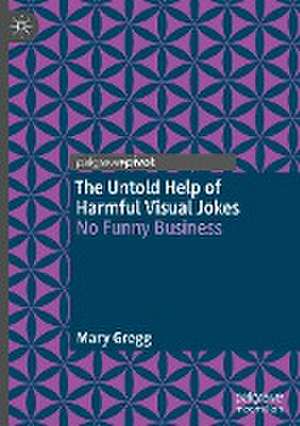The Untold Help of Harmful Visual Jokes: No Funny Business
Autor Mary Greggen Limba Engleză Hardback – 6 sep 2023
Preț: 316.91 lei
Nou
Puncte Express: 475
Preț estimativ în valută:
60.64€ • 66.08$ • 51.10£
60.64€ • 66.08$ • 51.10£
Carte tipărită la comandă
Livrare economică 23 aprilie-07 mai
Preluare comenzi: 021 569.72.76
Specificații
ISBN-13: 9783031399800
ISBN-10: 3031399803
Ilustrații: XVIII, 106 p. 7 illus.
Dimensiuni: 148 x 210 mm
Greutate: 0.3 kg
Ediția:1st ed. 2023
Editura: Springer Nature Switzerland
Colecția Palgrave Macmillan
Locul publicării:Cham, Switzerland
ISBN-10: 3031399803
Ilustrații: XVIII, 106 p. 7 illus.
Dimensiuni: 148 x 210 mm
Greutate: 0.3 kg
Ediția:1st ed. 2023
Editura: Springer Nature Switzerland
Colecția Palgrave Macmillan
Locul publicării:Cham, Switzerland
Cuprins
1. Harmful Jokes.- 2. The Unique Unspoken Discourse of Visual Jokes.- 3. The Harm of Harmful Visual Jokes.- 4. Reconciliation and Re-empowerment.- 5. A Brief Conclusion.
Notă biografică
Mary Gregg is a recent PhD graduate of the University of Connecticut, Storrs. She currently teaches at Yonsei University Underwood International College in South Korea. Her current research focuses on how oppressive visual humor meant to disempower a person or group can be taken up by the targeted person or group as a means of social re-empowerment.
Textul de pe ultima copertă
This book argues that when visual jokes are harmful, they harm in a specific way: a subject’s personhood is revoked in a way that differs both in kind and degree depending on whether that person is depicted or described. Such revocation can occur in every role and any stage within the joke’s context, from character to audience member, from moment of depiction to uncritical exposure. Unlike a mere unhumorous insult, which doesn’t require the sympathy of its audience but can operate solely between the target and the bully, a joke requires a particular kind of response from its audience to complete itself—to “deliver”, which requires not only some degree of complicity from audience members, but a complicity earned at the expense of the joke’s referent. This book shows how we need not prevent the occurrence of these things in order to undermine their oppressive power—we only need the right kind of recontextualization: turning those utterances into jokes or turning those jokes against themselves. Unlike other forms of visual oppression, the harms contained within visual jokes can be reconfigured to affirm those they were created to harm, changing their function from jokes which attack others to jokes which attack themselves, empowering those they were created to target by calling into question the problematic conceptions of audiences who are sympathetic to the harmful joke’s initial formulation.
Mary Gregg is a recent PhD graduate of the University of Connecticut, Storrs. She currently teaches at Yonsei University Underwood International College in South Korea. Her current research focuses on how oppressive visual humor meant to disempower a person or group can be taken up by the targeted person or group as a means of social re-empowerment.
Caracteristici
Shows how visual jokes (such as memes) are used to both degrade people and fight back against degradation Argues that the harms contained within visual jokes can be reconfigured to affirm those they were created to harm Studies internet culture and memes from a philosophical perspective
